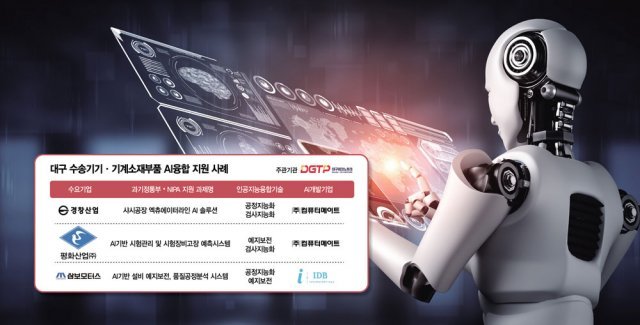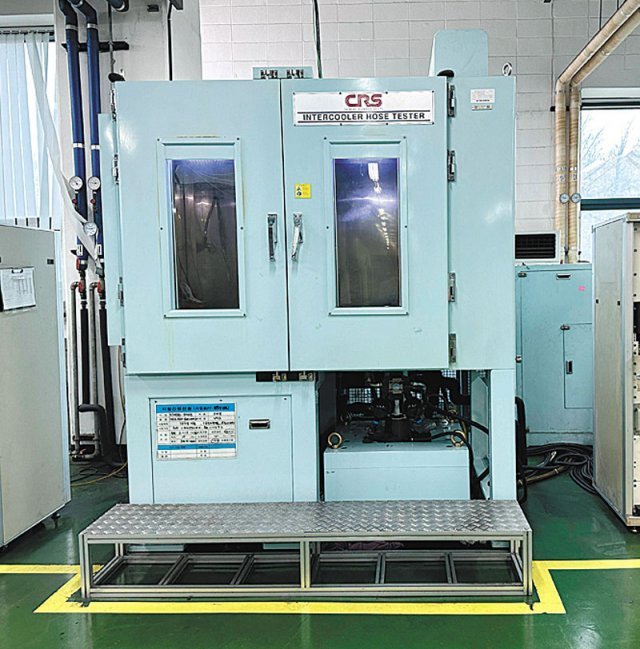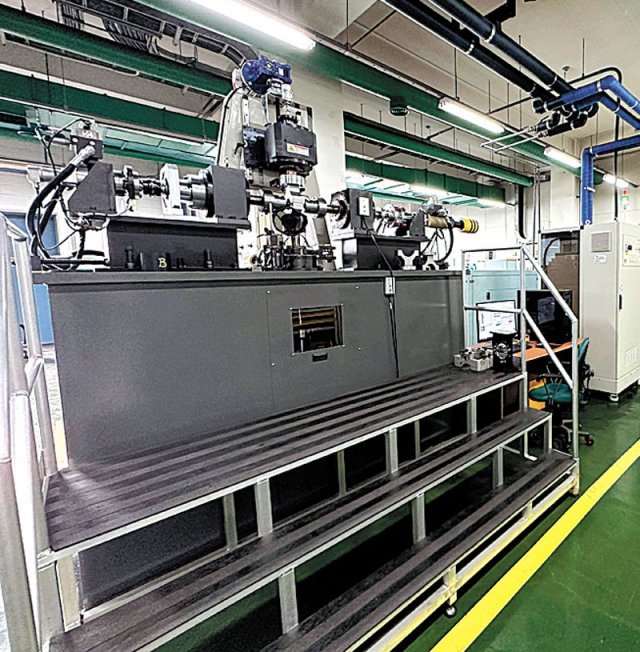Community
Press Release
2022-11-16
[Dong-A Ilbo] Daegu City leads the parts manufacturing industry with customized data analysis for companies
Daegu City leads the parts manufacturing industry with customized data analysis for companies.
6.757 billion won in support to local businesses
Development of artificial intelligence solution in empirical lab
Increased productivity and cost savings

Local small and medium-sized companies that focus on manufacturing experience various errors in product development or manufacturing processes even though they have excellent competitiveness. Manufacturing companies in the transportation equipment and mechanical material parts industries in Daegu, which are mainly first-tier suppliers of automobile companies, also have this problem. As we rely solely on human resources for predictive maintenance of facilities, quality process analysis, and production forecasting, many unexpected problems arise in the production process, which becomes an obstacle to increasing corporate competitiveness.
This year, Daegu City was selected for the 'AI Convergence Regional Specialized Industry Support Project' hosted by the Ministry of Science and ICT and the National IT Industry Promotion Agency (NIPA), and Daegu City and Daegu Techno Park are helping local manufacturing companies develop a new brain called artificial intelligence (AI). Started providing support for installation. The support amount is 6.757 billion won until next year.
In order to develop the transportation equipment and machinery materials and parts sector, which are specialized industries in the Daegu region, we match demand companies and supply companies to develop 5 types of AI convergence technologies and 9 types of verification tasks suitable for 8 demand companies, and after AI development is completed, we will implement them in the field. We provide thorough support so that it can be applied well. The empirical lab, which recently opened in Daegu Techno Park, is a space where AI supply companies develop customized AI technology based on data from demand companies, receive feedback from companies' needs, and produce the best results.
With the advent of the hyper-connected era, local industries that used to rely on people are also changing to AI. The great transition to digital will lead regional development through high productivity, and national infrastructure projects are also expected to become solid, becoming the starting point for new innovation.
○ Competitive companies are also seeking a ‘second leap’ with AI

An intercooler durability tester that evaluates the durability of hoses that operate through air in actual vehicles, such as intercooler hoses.
The convergence of AI technology provides a valuable opportunity for companies that have built up the highest level of competitiveness in Korea over a long history to take a bigger step toward the future. Gyeongchang Industry and Pyeonghwa Industry, which have established an unrivaled position in the manufacturing sector in Daegu for more than half a century, also participated as demand companies in the AI convergence local specialized industry support project.
Gyeongchang Industrial, a company specializing in automobile parts and located in Daegu for 50 years, mainly produces drive parts, chassis parts, and electric motorized parts. With about 1,300 employees, it boasts a very high level of competitiveness, including expansion into overseas business sites such as China and the United States. Due to the need to secure quality competitiveness through AI convergence, we participated in this project as a demand company. The goal is to reduce the defect rate by improving defect factors through AI.
Pyeonghwa Industry, which has established an unrivaled position as Korea's largest rubber parts producer over the past 70 years, also participated as a demand company. Pyung Hwa Industry, which produces vibration-proofing and hose-related products for vehicles through its own research institute and supplies stable parts to domestic and global automobile companies, is taking a second leap forward through rapid decision-making and efficient quality management in the product production process through data analysis. It was considered a necessary key to Most of the data, such as test facility operation rate, time, and test cycle of production products, was being collected and analyzed manually, which was causing various problems, which led to the need to introduce AI.
○ Improve quality competitiveness with customized AI solutions

A 4-axis durability tester that evaluates room temperature durability tests for bushings, which are vehicle suspension parts. Provided by Peace Industry
Computer Mate (CEOs Sang-in Seo and Seong-ho Kim) took on the role of adding AI to the manufacturing process sites of Gyeongchang Industry and Pyeonghwa Industry. This company specializes in production management system (MES) solutions that can be packaged according to the actual conditions of automobile-related manufacturing companies. In addition, we have been making efforts for several years to maximize synergy by converging existing MES solutions and AI. Last year, we formed an internal AI team, developed MES-based AI solutions, and are already applying these technologies to manufacturing sites.
For Gyeongchang Industries, we are developing a solution that can automatically suggest facility condition values using an AI model to reduce worker dependence, minimize risks, and derive optimal facility conditions based on AI data rather than product production based on worker experience. Applying this solution is expected to reduce defects in Gyeongchang Industrial's manufacturing process and improve productivity by reducing rework. In addition, real-time facility data collection, analysis, and monitoring become possible, allowing quality abnormalities to be quickly identified, and optimal facility condition values are expected to improve productivity by 7% and reduce costs by 30%.
In addition, Pyeonghwa Industry is developing an AI engine that uses AI models based on sensor data attached to the test machine to notify test machine failures in advance, reducing downtime and suggesting optimal scheduling when requesting a test. In addition, we are building a system that monitors operating conditions in real time through automatically collected data to ensure smooth test management. Through such integrated test management and facility failure prediction, it is expected that it will be possible to shorten physical test lead time, improve test productivity, improve work efficiency through systemization, and immediately respond to abnormal situations through real-time monitoring. It is expected that the operation rate, equipment failure reduction rate, and test period reduction rate will each improve by 7%.
○ Limitations in smart factory and automation construction are also resolved with AI
Sambo Motors, located in Dalseo-gu, Daegu, is a global parts manufacturing company that focuses on automatic transmissions, engines and fuel systems, interior and exterior plastic parts, electric vehicle parts, and tuning businesses. We are moving into the future by developing new technologies through our own research institute and establishing a manufacturing execution system and automation system through smart factories since 2018 to secure technological capabilities for future cars. In order to take a bigger step toward becoming a global company that can compete in the global market, Sambo Motors also sought the need to introduce an AI system and participated in this project as a demand company. Sambo Motors is participating in the smart factory distribution project to improve productivity and quality, but judged that it is difficult to secure global-level quality control capabilities with the current smart factory manufacturing execution system, and is collaborating with AI company IDB (CEO Bo-kyung Min). We are working to build an ‘AI-based facility predictive maintenance and quality process analysis system.’
IDB is a company with the technology to collect Internet of Things (IoT) data, analyze it with AI, and monitor it in real time. Last year, we also participated in the AI specialized industry support project in the Chungbuk region and supplied process intelligence technology to local cosmetics manufacturing companies. IDB is developing an AI solution that predicts more than 90% of the time of defect occurrence by learning the work order history and defect information of the manufacturing workshop, and tracks defect influencing factors by analyzing the influence relationship between defects and reasons for non-operation. By introducing this solution, optimal settings and process operation will be possible through analysis of defect types through AI. Through this, we expect to reduce the process defect rate by 2.8% and lower the inventory rate by 16% by improving facility operation.
IDB CEO Min Bo-kyung said, “We will apply solutions such as AI modeling and analysis systems, which are essential in the smart factory advancement stage, to various manufacturing companies,” adding, “Our technology will be further developed through the AI convergence regional specialized industry support project.” “We will strive to become more sophisticated and help improve the competitiveness of the domestic manufacturing sector,” he said.
[Source] Donga Ilbo, Reporter Jang Yun-jung, yunjung@donga.com https://www.donga.com/news/article/all/20221115/116494445/1
6.757 billion won in support to local businesses
Development of artificial intelligence solution in empirical lab
Increased productivity and cost savings

Local small and medium-sized companies that focus on manufacturing experience various errors in product development or manufacturing processes even though they have excellent competitiveness. Manufacturing companies in the transportation equipment and mechanical material parts industries in Daegu, which are mainly first-tier suppliers of automobile companies, also have this problem. As we rely solely on human resources for predictive maintenance of facilities, quality process analysis, and production forecasting, many unexpected problems arise in the production process, which becomes an obstacle to increasing corporate competitiveness.
This year, Daegu City was selected for the 'AI Convergence Regional Specialized Industry Support Project' hosted by the Ministry of Science and ICT and the National IT Industry Promotion Agency (NIPA), and Daegu City and Daegu Techno Park are helping local manufacturing companies develop a new brain called artificial intelligence (AI). Started providing support for installation. The support amount is 6.757 billion won until next year.
In order to develop the transportation equipment and machinery materials and parts sector, which are specialized industries in the Daegu region, we match demand companies and supply companies to develop 5 types of AI convergence technologies and 9 types of verification tasks suitable for 8 demand companies, and after AI development is completed, we will implement them in the field. We provide thorough support so that it can be applied well. The empirical lab, which recently opened in Daegu Techno Park, is a space where AI supply companies develop customized AI technology based on data from demand companies, receive feedback from companies' needs, and produce the best results.
With the advent of the hyper-connected era, local industries that used to rely on people are also changing to AI. The great transition to digital will lead regional development through high productivity, and national infrastructure projects are also expected to become solid, becoming the starting point for new innovation.
○ Competitive companies are also seeking a ‘second leap’ with AI

An intercooler durability tester that evaluates the durability of hoses that operate through air in actual vehicles, such as intercooler hoses.
The convergence of AI technology provides a valuable opportunity for companies that have built up the highest level of competitiveness in Korea over a long history to take a bigger step toward the future. Gyeongchang Industry and Pyeonghwa Industry, which have established an unrivaled position in the manufacturing sector in Daegu for more than half a century, also participated as demand companies in the AI convergence local specialized industry support project.
Gyeongchang Industrial, a company specializing in automobile parts and located in Daegu for 50 years, mainly produces drive parts, chassis parts, and electric motorized parts. With about 1,300 employees, it boasts a very high level of competitiveness, including expansion into overseas business sites such as China and the United States. Due to the need to secure quality competitiveness through AI convergence, we participated in this project as a demand company. The goal is to reduce the defect rate by improving defect factors through AI.
Pyeonghwa Industry, which has established an unrivaled position as Korea's largest rubber parts producer over the past 70 years, also participated as a demand company. Pyung Hwa Industry, which produces vibration-proofing and hose-related products for vehicles through its own research institute and supplies stable parts to domestic and global automobile companies, is taking a second leap forward through rapid decision-making and efficient quality management in the product production process through data analysis. It was considered a necessary key to Most of the data, such as test facility operation rate, time, and test cycle of production products, was being collected and analyzed manually, which was causing various problems, which led to the need to introduce AI.
○ Improve quality competitiveness with customized AI solutions

A 4-axis durability tester that evaluates room temperature durability tests for bushings, which are vehicle suspension parts. Provided by Peace Industry
Computer Mate (CEOs Sang-in Seo and Seong-ho Kim) took on the role of adding AI to the manufacturing process sites of Gyeongchang Industry and Pyeonghwa Industry. This company specializes in production management system (MES) solutions that can be packaged according to the actual conditions of automobile-related manufacturing companies. In addition, we have been making efforts for several years to maximize synergy by converging existing MES solutions and AI. Last year, we formed an internal AI team, developed MES-based AI solutions, and are already applying these technologies to manufacturing sites.
For Gyeongchang Industries, we are developing a solution that can automatically suggest facility condition values using an AI model to reduce worker dependence, minimize risks, and derive optimal facility conditions based on AI data rather than product production based on worker experience. Applying this solution is expected to reduce defects in Gyeongchang Industrial's manufacturing process and improve productivity by reducing rework. In addition, real-time facility data collection, analysis, and monitoring become possible, allowing quality abnormalities to be quickly identified, and optimal facility condition values are expected to improve productivity by 7% and reduce costs by 30%.
In addition, Pyeonghwa Industry is developing an AI engine that uses AI models based on sensor data attached to the test machine to notify test machine failures in advance, reducing downtime and suggesting optimal scheduling when requesting a test. In addition, we are building a system that monitors operating conditions in real time through automatically collected data to ensure smooth test management. Through such integrated test management and facility failure prediction, it is expected that it will be possible to shorten physical test lead time, improve test productivity, improve work efficiency through systemization, and immediately respond to abnormal situations through real-time monitoring. It is expected that the operation rate, equipment failure reduction rate, and test period reduction rate will each improve by 7%.
○ Limitations in smart factory and automation construction are also resolved with AI
Sambo Motors, located in Dalseo-gu, Daegu, is a global parts manufacturing company that focuses on automatic transmissions, engines and fuel systems, interior and exterior plastic parts, electric vehicle parts, and tuning businesses. We are moving into the future by developing new technologies through our own research institute and establishing a manufacturing execution system and automation system through smart factories since 2018 to secure technological capabilities for future cars. In order to take a bigger step toward becoming a global company that can compete in the global market, Sambo Motors also sought the need to introduce an AI system and participated in this project as a demand company. Sambo Motors is participating in the smart factory distribution project to improve productivity and quality, but judged that it is difficult to secure global-level quality control capabilities with the current smart factory manufacturing execution system, and is collaborating with AI company IDB (CEO Bo-kyung Min). We are working to build an ‘AI-based facility predictive maintenance and quality process analysis system.’
IDB is a company with the technology to collect Internet of Things (IoT) data, analyze it with AI, and monitor it in real time. Last year, we also participated in the AI specialized industry support project in the Chungbuk region and supplied process intelligence technology to local cosmetics manufacturing companies. IDB is developing an AI solution that predicts more than 90% of the time of defect occurrence by learning the work order history and defect information of the manufacturing workshop, and tracks defect influencing factors by analyzing the influence relationship between defects and reasons for non-operation. By introducing this solution, optimal settings and process operation will be possible through analysis of defect types through AI. Through this, we expect to reduce the process defect rate by 2.8% and lower the inventory rate by 16% by improving facility operation.
IDB CEO Min Bo-kyung said, “We will apply solutions such as AI modeling and analysis systems, which are essential in the smart factory advancement stage, to various manufacturing companies,” adding, “Our technology will be further developed through the AI convergence regional specialized industry support project.” “We will strive to become more sophisticated and help improve the competitiveness of the domestic manufacturing sector,” he said.
[Source] Donga Ilbo, Reporter Jang Yun-jung, yunjung@donga.com https://www.donga.com/news/article/all/20221115/116494445/1
Back to list

